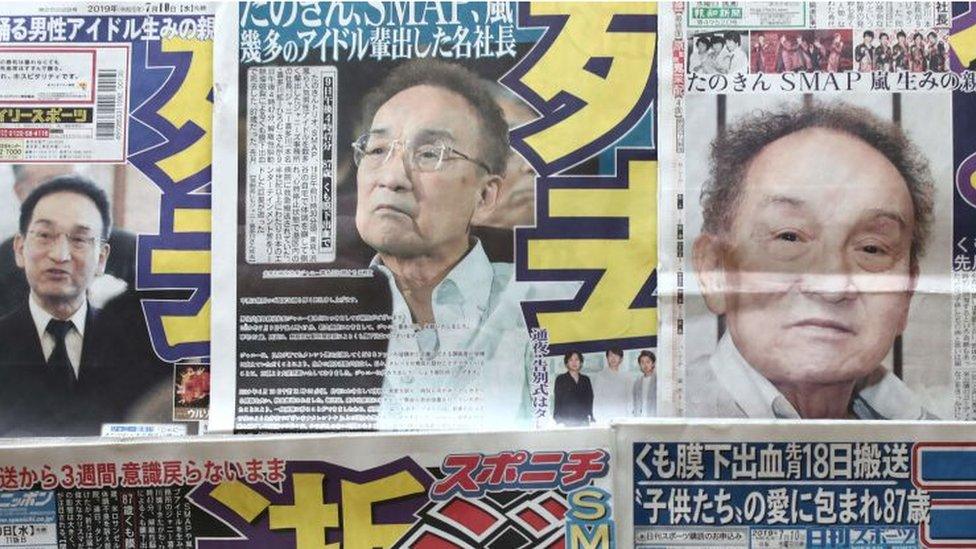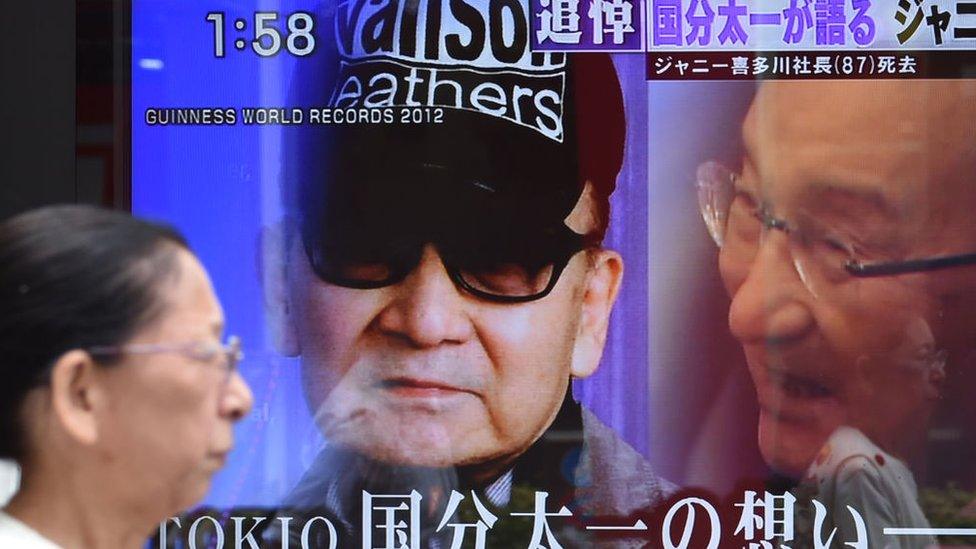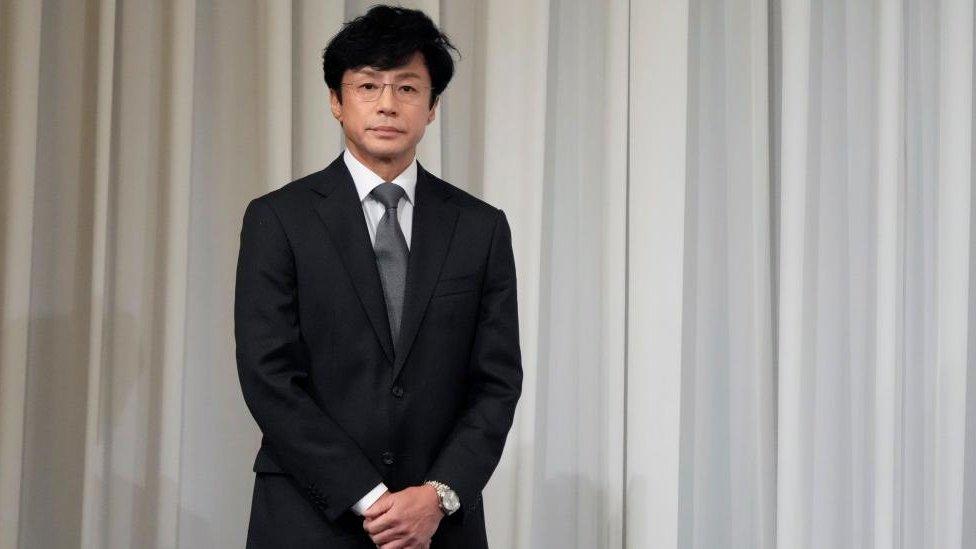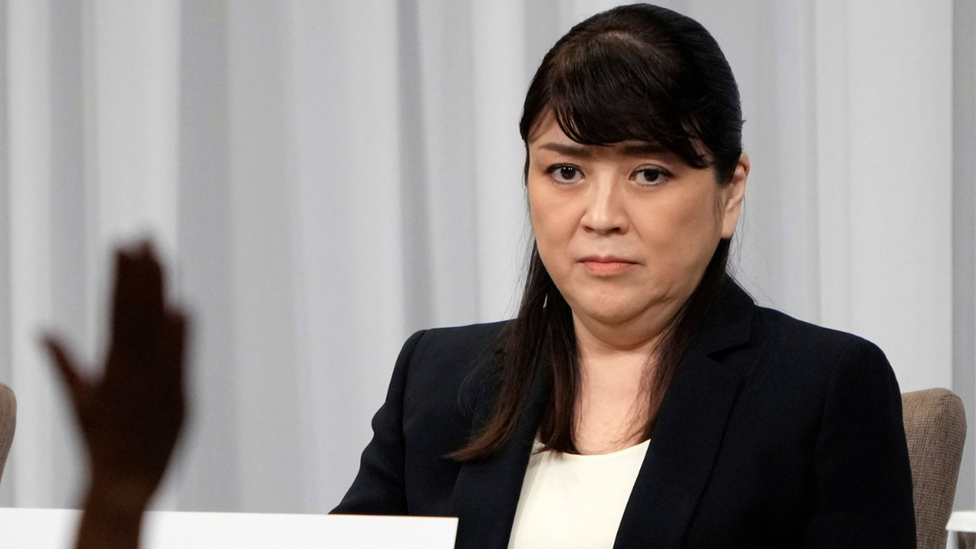Johnny Kitagawa: Hundreds seek compensation over J-pop agency founder's abuse
- Published

Victims of J-pop mogul Johnny Kitagawa will be entitled to compensation, his agency says
More than 300 people are seeking compensation for being sexually abused by Japan's top talent agent, the late Johnny Kitagawa, his agency says.
Allegations against Kitagawa, who died in 2019, came into prominence again after a BBC documentary inspired more victims to come forward.
In September, an independent inquiry concluded that the music mogul had abused hundreds of boys and young men over a six-decade career.
It also urged compensation for victims.
The Johnny & Associates agency on Monday revealed 478 people had responded to a website it had set up for recompense- 325 of whom were seeking compensation as victims. The agency said 150 of these people were former talents.
The pop agency renamed itself -SMILE-UP- and said the newly named entity would deal solely with identifying and compensating victims. A new company will be created to manage the talent.
The agency has said it will determine financial pay-outs for each victim on a case-by-case basis.
Earlier this year the agency had apologised to victims and following the inquiry's findings, the then chief executive Julie Fujishima - Kitagawa's niece- stepped down.
She has been replaced by Noriyuki Higashiyama, a television star and singer in Japan who has also been accused of sexual misconduct - allegations he denied on Monday.
"I have never sexually harassed anyone. Some people may have felt I was power-harassing them, but it was 35-40 years ago, and I probably wouldn't have been able to understand what sexual abuse is," he said.
Upon taking the leadership mantle in early September, Higashiyama said the agency was not sure if it would depart from the Johnnys name.
The restructure is believed to be an attempt to win back public acceptance - major Japanese companies such as Nissan, Asahi and Suntory dropped the agency's talent after the inquiry.
The Kitagawa scandal in Japan has drawn comparisons with Hollywood mogul Harvey Weinstein who was convicted of rape and sexual assault.
However Kitagawa never faced criminal charges and he remained a revered figure until his death at age 87 in 2019 - with his passing also drawing public condolences from Japan's prime minister at the time.
The J-pop industry titan was seen as one of the richest and most powerful men in Japan. For decades, he was responsible for launching the country's most famous boybands and artists.
His abuse was also considered an open secret in Japan's music industry. He faced allegations for much of his career and some cases against him were even proven in civil court- however he also successfully sued for defamation over those reports and always denied wrongdoing.
Most mainstream Japanese media also did not cover the allegations for decades, prompting accusations of an industry cover-up.
Then in March, the BBC's documentary Predator: The Secret Scandal of J-Pop which detailed Kitagawa's abuse was aired, sparking national discussion and calls for a full investigation.
Several victims told the BBC they thought their careers would be harmed if they did not comply with Kitagawa's sexual demands.
The broadcast led to more victims coming forward - including a former J-pop idol Kauan Okamato- who deliberately held his press conference at the Foreign Correspondents Club in Tokyo for international media. He revealed he had been sexually abused by Kitagawa for four years, from the age of 15.
He and several other victims spoke out after the resignation of Ms Fujishima last month. Her resignation also marked the agency's first public acknowledgement of Kitagawa's crimes.
One man who identified as a victim spoke at a press conference held by the Johnny's Sexual Assault Victims' Association.
"I've learned that if you decide to act, you can change things. We don't have to walk looking down - we can look forward," he said.
- Published8 September 2023

- Published8 September 2023

- Published7 September 2023
